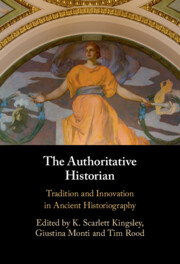Book contents
- The Authoritative Historian
- The Authoritative Historian
- Copyright page
- Dedication
- Contents
- Contributors
- Preface
- Abbreviations
- Introduction
- Part I Myth, Fiction, and the Historian’s Authority
- Chapter 1 Seven Types of Fiction in the Greek Historians
- Chapter 2 Folktale and Local Tradition in Charon of Lampsacus
- Chapter 3 Mythical and Historical Time in Herodotus
- Chapter 4 Myth and History in Livy’s Preface
- Part II Dislocating Authority in Herodotus’ Histories
- Part III Performing Collective and Personal Authority
- Part IV Generic Transformations
- Part V Innovation within Tradition
- Bibliography
- Index Locorum
- General Index
Chapter 1 - Seven Types of Fiction in the Greek Historians
from Part I - Myth, Fiction, and the Historian’s Authority
Published online by Cambridge University Press: 02 December 2022
- The Authoritative Historian
- The Authoritative Historian
- Copyright page
- Dedication
- Contents
- Contributors
- Preface
- Abbreviations
- Introduction
- Part I Myth, Fiction, and the Historian’s Authority
- Chapter 1 Seven Types of Fiction in the Greek Historians
- Chapter 2 Folktale and Local Tradition in Charon of Lampsacus
- Chapter 3 Mythical and Historical Time in Herodotus
- Chapter 4 Myth and History in Livy’s Preface
- Part II Dislocating Authority in Herodotus’ Histories
- Part III Performing Collective and Personal Authority
- Part IV Generic Transformations
- Part V Innovation within Tradition
- Bibliography
- Index Locorum
- General Index
Summary
On the flyleaf of his personal copy of The Red and the Black, Stendhal wrote: ‘I believe that the truth in small as in large things, is almost unattainable – at least a truth that is somewhat circumstantial. Monsieur de Tracy used to say to me: truth can be found only in novels.’1 Ever since the emergence of ‘scientific’, evidence-based history during the second half of the nineteenth century,2 the discipline of ancient history has set itself the task of establishing what actually happened in the past. In this day and age such positivism may well seem naïve to many, yet the ancient Greek and Roman historians themselves deserve much of the responsibility for giving the overall impression that their narratives correspond closely to events as they in fact happened. This is because they have the power to cast a spell over their readers by creating narratives that are so intensely vivid that the events seem to be taking place before our very eyes.3 And that raises the question of what kind of truth they were attempting to reveal. Is it a truth that today can be found only in novels?
- Type
- Chapter
- Information
- The Authoritative HistorianTradition and Innovation in Ancient Historiography, pp. 19 - 40Publisher: Cambridge University PressPrint publication year: 2023



